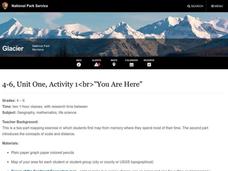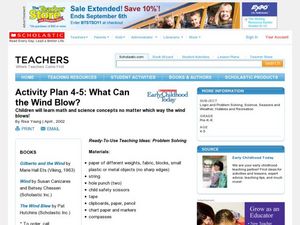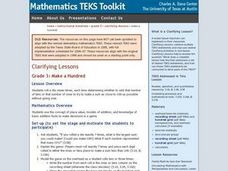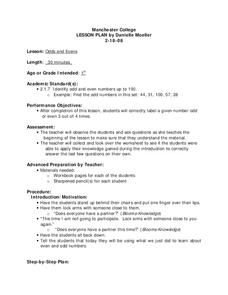Pennsylvania Department of Education
Modeling Spatial Relationships
Students model spatial relationships using math manipulatives. In this spatial relationships lesson, students work with a partner, and either connecting links or linking cubes that are three different colors. They explain to each other...
Curated OER
What Lives in Water: Pre and Post Activities
In this multiple choice worksheet, learners answer questions about fish and how fish live. After visiting the aquarium, students chart the different creatures they see during their visit and solve mathematical equations of their findings.
Curated OER
Winter-time Temps
Students measure temperature and become aware the the temperature above and below the snow is different. In this winter temperature lesson, students measure temperatures to find variation based on how the snow is packed. Students create...
Curated OER
You Are Here
Students map local places and learn to use scale and distance. In this mapping lesson, students map their school and a favorite place. Students recreate their maps showing distance and scale sizes. Students locate their location on a...
Curated OER
Square Numbers Closure Activity
Students discuss square numbers. For this math lesson, students find square numbers and support their answers. Students find sums and products that are square numbers.
Teach Engineering
Quantum Dots and the Harkess Method
The Fantastic Voyage is becoming close to reality. The class reads an article on the use of nanotechnology in the medical field and participate in a discussion about what they read. The discussion method helps class members become more...
Curated OER
Study Buddies: Estimating Quotients
In this math worksheet, students will work with a coach to solve a division problems by estimating quotients. Students will follow a step-by-step process and notes are provided for the coach.
Curated OER
What Can the Wind Blow?
Students observe math and science concepts no matter which way the wind blows. In this early childhood problem solving instructional activity, students will develop science, math, and observation skills as they learn about the wind.
Curated OER
Monster Symmetry
Third graders understand what a line of symmetry is and how to draw symmetrically. In this monster symmetry lesson, 3rd graders create an original monster that is symmetrical. Students participate in additional symmetry activities.
Curated OER
Shapes (Orienteering)
Students explore the tools of navigation. In this shapes lesson, students navigate using direction cues to create a shape. Students follow specific steps to create their shapes. Students use compasses to see the directions they are...
Curated OER
Beef or Dairy?
Guernsey, Jersey, Holstein. Brangus, Charoloais, Herford. Here’s a truly cross-curricular resource that combines language arts, science, math, and visual arts activities as class members learn to distinguish between beef and dairy...
Curated OER
Grade 3: Make a Hundred
Third graders roll a die seven times, each time determining whether to add that number of tens or that number of ones to try to make a sum as close to 100 as possible without going over.
Curated OER
Cards to 24
Third graders practice with a deck of cards to play a version of the math game 24. They use four cards and combinations of the four arithmetic operations to try to make a total of 24. Each student writes and solves problems which...
Curated OER
Shopping
Young scholars demonstrate how to count money through a simulated shopping experience. In this consumer math lesson, students read the book Just Shopping With Mom and count play money to illustrate how much the items in the book cost.
Curated OER
Shopping for Savings
Fourth graders calculate savings and identify the best value items from a list of products. They rotate through five studying stations, completing various math activities involving calculators and solving problems related to shopping...
Curated OER
The Game of Chance
Third graders use manipulatives to determine the probability of outcomes. In this probability lesson plan, 3rd graders roll dice and use spinners to determine the probability of outcomes. They determine if games are fair/unfair based on...
Curated OER
Odd and Even
First graders identify odd and even numbers. In this odd and even numbers lesson, 1st graders participate in a partner activity to determine odd and even. Students break into groups and lock arms together and are asked if they have a...
Curated OER
Reaction Time
Students record reaction time data and calculate minimum, maximum, mean, median, and mode. They participate in a class reaction time activity, observe and conduct an online experiment, and discuss and analyze the activity results.
Curated OER
Bedroom Floor Plan
Students identify and compare the characteristics of floor plans and zoning to family activities and needs. They draw an accurate floor plan--either existing or a work in progress to scale. Then, students roughly sketch their bedroom...
Curated OER
A Reading Graph
Young scholars construct and interpret a "favorite classroom books" graph. In this literacy and math graphing lesson, students choose a reduced size copy of the book cover that corresponds with the book(s) they chose to read during their...
Pennsylvania Department of Education
Equal Groups
Students explore statistics by completing a graphing activity. In this data analysis lesson, students define a list of mathematical vocabulary terms before unpacking a box of raisins. Students utilize the raisins to plot data on a line...
Curated OER
Making Molecular Models
In these creative hands-on activities, students construct several different molecular models that represent substances that play an essential role in our nutritional needs. Using gum drops and toothpicks, students design the models....
Curated OER
Binaural Hearing in Humans
In this creative science activity from Scientific American, young scholars learn more about hearing with two ears and make a hands-on exploration of how sound is located. Excellent web link resources are also provided.
Curated OER
Time: Attribute
Students participate in five teacher-led, whole class activities that explore sequences of time and the concept of faster and slower. They sequence school day events, create a book of their daily schedule, put the days of the week in...

























